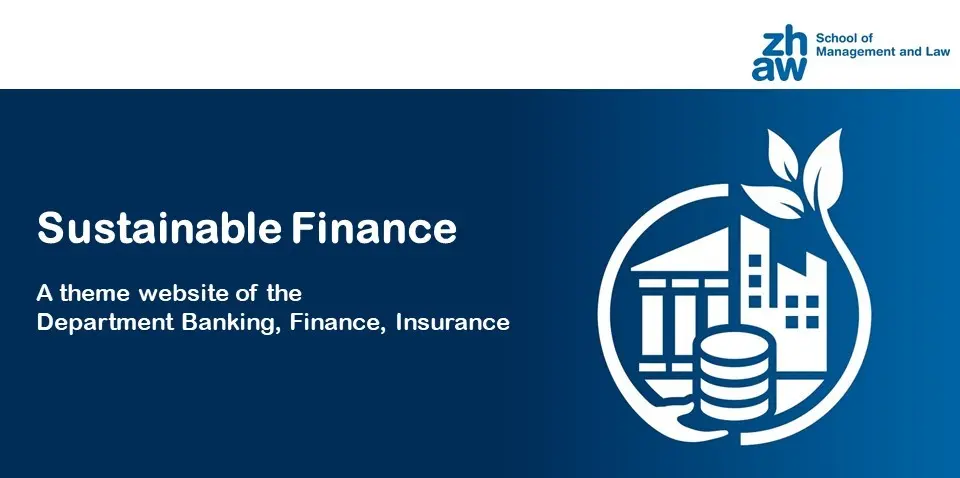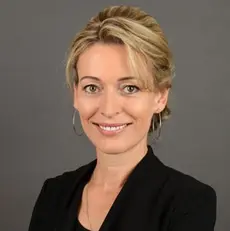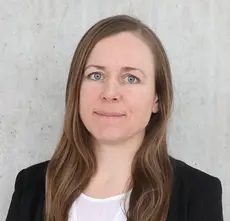Sustainable Finance
Sustainability in the financial sector is becoming increasingly important. ZHAW experts teach, research and advise in the field of sustainable finance.

Sustainable Financing
Sustainable Corporate Financing
Sustainable finance includes both the consideration of sustainability in financing and the financing of sustainability solutions or sustainability transformations. Besides specific financing instruments, the credit process and innovative financing solutions to close the financing gap to achieve the UN Sustainable Development Goals are also considered. In addition, there is engagement in various networks (Green Fintech Network / Swiss Sustainable Finance) and bank/company specific training as well as certificate and continuing education programs are offered (CAS Corporate Finance & Sustainability / Continuing Education Course on Sustainability and Financing / EdX-Course Sustainable Corporate Financing).
Your Partners for Sustainable Financing

Prof. Dr. Beat Affolter heads the Center for Corporate Performance & Sustainable Financing at the Institute for Financial Management. In his research activities, he is primarily concerned with sustainable corporate financing. Current projects include improving the financing of fair-trade producers, sustainability in the credit sector and quantifying sustainable financing policies.

Andreas Schweizer is a senior lecturer and project manager for corporate banking and sustainable financing projects. In his research activities, he deals with the collaboration and the respective needs of capital providers and capital recipients. He is also interested in the early detection and prevention of corporate crisis situations. Andreas Schweizer is your contact for in-house sustainability training.

Patrick Röthlisberger is a research associate and project manager in Sustainable Financing. In his research activities, he is mainly concerned with sustainable credit instruments and corporate finance in general. In current projects, he deals with the integrated modeling of foreign currency risks in industrial companies.

Dr. Andreas Hecht is a lecturer in Financial Management & Sustainable Financing. In the context of his research activities, he deals with sustainable financial literacy, as well as interdependencies of sustainable corporate finance, risk management and sustainability reporting.
Further education on the topic
- Continuing Education Sustainable Financing Expert
- CAS Corporate Finance & Sustainability
- EdX-Course Sustainable Corporate Financing
- Webinar Sustainable Financing
Current projects on the topic
- Overall Bank Training on Sustainability
- Implementation and development of a training course on sustianbility in lending
- EdX-Course Sustainable Corporate Financing
- Sustainable Lending
- Development of a quantitative framework for a sustainable financing policy
- Decentralized financing of Fairtrade producers using a blockchain-based solution
- Improving the financing situation of medium-sized turnaround companies
- Dealing with interest rate risks in corporate financing
- Modeling and pricing of participating loans in the context of crowdlending
Current publications on the topic
- Schweizer, Andreas; Röthlisberger, Patrick; Affolter, Beat, 2022. Nachhaltigkeit in der Fremdfinanzierung : aktuelle Entwicklungen am Kapital- und Bankenmarkt und erwarteter Einfluss auf KMU. Expert Focus. 2022(12), S. 604-611.
- Affolter, Beat; Meyer, Julia; Richter, Thomas; Röthlisberger, Patrick; Schweizer, Andreas, 2022. Nachhaltigkeit in der Kreditfinanzierung. Swiss Sustainable Finance. Verfügbar unter: Link zum Beitrag
- Affolter, Beat, 2022. Chancen und Risiken einer steigenden Bedeutung von Nachhaltigkeit für die Unternehmensfinanzierung. Recht relevant. für Verwaltungsräte, Zürich, Switzerland. Verfügbar unter: Link zum Beitrag
- Affolter, Beat; Seiler, Alexander, 2020. Ein Stresstest für Schweizer Immobiliengesellschaften. Finanz und Wirtschaft. 2020(50), S. 9. Verfügbar unter: Link zum Beitrag
- Affolter, Beat; Mostowfi, Mehdi, 2019. Auswirkungen der Niedrigzinsphase auf die Unternehmensfinanzierung in der Schweiz. Expert Focus. 2019(8), S. 576-583. Verfügbar unter: https://doi.org/10.21256/zhaw-18146
- Schweizer, Andreas; Loch, Anne Marie; Graf, Ramona, 2019. Finanzierung in der MEM-Industrie: gut mit Verbesserungspotenzial. Die Volkswirtschaft. 2019(11), S.39-41. Verfügbar unter: https://dievolkswirtschaft.ch/de/2019/10/schweizer-loch-graf-11-2019/
Sustainability Controlling
Companies’ various stakeholder groups are becoming increasingly interested in and knowledgeable about sustainability. This, along with global regulatory developments and imposed sustainability targets, is making it more and more important to align one’s controlling with sustainability and impact metrics. In this context, companies have many questions concerning, for example, the quantification and comparability of such qualitative factors, or how best to strategically integrate them into existing controlling processes. The communication of these additional, non-financial key figures also leads to exciting questions such as how this information is absorbed by investors in direct financing and on the capital market.
Your Partners in Sustainability Controlling

Dr. Julia Meyer’s research work focuses on the question of how the impact and sustainability of companies and products can be quantified to their best advantage. Current projects include the detailed analysis of the information content of sustainability ratings of different providers and the question whether sustainable companies show resilience in a global crisis. Julia Meyer is your contact for in-house sustainability training.

Niccole Jordan heads the Digital Transformation research group. Her research areas include digital transformation in finance and sustainability in controlling. Currently, she is exploring the use of green controlling elements in SMEs.
Current publications on the topic
- Mahmoud, Ola; Meyer, Julia, 2020. The anatomy of sustainability. Available at: https://doi.org/10.2139/ssrn.3597700
- Meyer, Julia; Schüpbach, Luca Maria; Utz, Sebastian, 2020. Capital-market effects of ESG scores : evidence from a quasi-natural experiment. SSRN. Available at: https://doi.org/10.2139/ssrn.3683100
- Meyer, Julia; Krauss, Annette, 2020. The Social Performance of Microfinance Investment Vehicles. Journal of Sustainable Finance and Investment. Available at: https://doi.org/10.1080/20430795.2020.1715094
Sustainability Reporting
Responsible behavior has become an explicit requirement of entrepreneurial activity in many respects: The pursuit of economic goals requires a balanced consideration of ESG (environmental, social, and governance) criteria. Sustainability reports are, therefore, becoming an indispensable part of modern business reporting and reliable corporate communication. In addition, they are generally gaining in importance because such disclosure goes hand in hand with a sustainability rating - something that companies, even SMEs, are increasingly expected to have.
Your Partners for Sustainability Reporting

Prof. Dr. Gabriela Nagel-Jungo heads the Institute for Financial Management. She has extensive experience in accounting (including sustainability reporting), both due to her academic background (see Publications), her engagements as a senior lecturer, and her involvement as a practitioner (e.g., in introducing sustainability reporting according to the standards of the Global Reporting Initiative (GRI)).

Andreas Buchs is a lecturer at the Institute of Financial Management. He has in-depth experience in financial accounting, financial reporting and auditing. He is involved in sustainability reporting in various teaching activities (including Bachelor / Master / CAS) as well as publications (see below).
Current publications on the topic
- Nagel-Jungo, Gabriela; Knust, Lucas, 2023. Nachhaltigkeitsberichterstattung. Jahrbuch Finanz- und Rechnungswesen. WEKA. S. 169-195
- Nagel-Jungo, Gabriela; Buchs, Andreas; Nägeli, Alexander, 2020. Berichterstattung zu nachhaltigem Wirtschaften : Rahmenbedingungen und Umsetzung bei kotierten Unternehmen. Expert Focus. 2020(10), S.722-729.
- Affolter, Beat; Bärtschi, Harald; Brändli, Beat; Buchs, Andreas, 2020. Quo Vadis, Schweizer Nachhaltigkeitsberichterstattung? : auf dem Weg zu einem Swiss Code of Sustainability Reporting. Expert Focus. 2020(9), S.630-635.
-
Nagel-Jungo, Gabriela; Alves, Silke, 2018. Megatrends der Unternehmensberichterstattung. Zeitschrift für internationale Rechnungslegung. 2018(10), S. 449-455. Available at: https://beck-online.beck.de/Dokument?vpath=bibdata%2Fzeits%2Firz%2F2018%2Fcont%2Firz.2018.449.1.htm&pos=0
-
Nagel-Jungo, Gabriela; Affolter, Beat, 2016. Nachhaltigkeitsberichterstattung bei Banken. Zeitschrift für internationale Rechnungslegung. 2016(11), S.475-480.
- Nagel-Jungo, Gabriela; Affolter, Beat, 2016. Nachhaltigkeitsberichterstattung im Rahmen integrierter Berichterstattung. Zeitschrift für internationale Rechnungslegung. 2016(10), S.427-433.
Events on the topic
- Webinar on 28.03.2023: «öbu-Big Picture: Which non-financial reporting obligations are companies in Switzerland facing?". (Link to the recording)
Sustainable Investing
Innovation & Alternative Data
In the face of climate change and global pollution, there is an urgent need for ESG-compliant investments and policies. Unfortunately, most ESG data are based on company self-reporting and provide little transparency and even less guidance to stakeholders, investors, and policymakers. By exploring novel data sets such as patent data, satellite maps, or web-based data, sustainability can be assessed in an objective, timely, and verifiable manner to identify ESG risks and opportunities.
Your Partners for Innovation & Alternative Data

Prof. Dr. Jan Alexander-Posth – Greentech, green investing, patent data, innovation, artificial intelligence, and machine learning
Alex is a scholar with a quantitative and scientific education as well as a practitioner with over 15 years of professional experience in banking and finance. He is involved in a variety of projects at the intersection of digitalization, sustainability, and green investing. He is a DIZH Fellow (ESG 4.0 – Enabling Sustainable and Responsible Investment leveraging AI and Big Data) and represents ZHAW as a Board Observer in the Green Fintech Network.

Dr. Tomasz Orpiszewski – Spatial finance, remote sensing, asset-level data, SME data retrieval from websites and social media
Tomasz has seven years of professional experience in asset management as a fixed income strategist, economist, quant analyst, and fund manager. In the field of sustainable investments, he focuses on aspects of spatial finance, biodiversity, incident data, data retrieval, and technology for impact investing.
Current projects on the topic
- BioVaR – Assessing and Digitizing Risk Exposure Resulting from Biodiversity Loss
- Spatial sustainable finance: Satellite-based ratings of company footprints in biodiversity and water
- Investor and Stakeholder Tools for Tracking Companies’ Climate Commitments, Greenwashing and ESG Trends
- Development of Customizable ESG-compliant Financial Products for Swiss Asset Owners and Managers
- ESG 4.0 – Enabling Sustainable and Responsible Investment leveraging AI and Big Data
- Evidence-based Sustainable Finance
- Hybrid Approach for Robust Identification and Measurement of Investors Driving Corporate Sustainability and Innovation. Design of Policy Tools for Evaluating the Impact of Specific Investors and Assessing the Quality of Companies’ Investor Bases
- Feeder Structure for the Swiss Social Exchange
- Patent data technology clusters as selectors for ESG-relevant impact investing topics
Current publications on the topic
- Gramespacher, Thomas; Posth, Jan-Alexander, 2021. Employing explainable AI to optimize the return target function of a loan portfolio. Frontiers in Artificial Intelligence. 4(693022). Available at: https://doi.org/10.3389/frai.2021.693022
- Hadji Misheva, Branka; Jaggi, David; Posth, Jan-Alexander; Gramespacher, Thomas; Osterrieder, Joerg, 2021. Audience-dependent explanations for AI-based risk management tools : a survey. Frontiers in Artificial Intelligence. 4(794996). Available at: https://doi.org/10.3389/frai.2021.794996
- Posth, Jan-Alexander; Hadji Misheva, Branka; Kotlarz, Piotr Kamil; Osterrieder, Jörg; Schwendner, Peter, 2021. The Applicability of Self-Play Algorithms to Trading and Forecasting Financial Markets. Front. Artif. Intell.. Available at: https://doi.org/10.3389/frai.2021.668465
- Hadjikyriakou, Phanos; Orpiszewski, Tomasz; Posth, Jan-Alexander, 2020. Climate indices for listed equity : comparing different methods to minimise climate risk exposure. In: FINANCING THE LOW-CARBON ECONOMY : Instruments, Barriers and Recommendations. Zürich: Swiss Sustainable Finance. S.20-23. Available at: https://www.sustainablefinance.ch/upload/cms/user/2020_11_19_Financing_the_Low_Carbon_Economy_EN_full_report_final.pdf
Investment Product & Investment Strategies
Do you want to consider ecological growth, social values, and responsible corporate governance in your investment decisions, all while not losing sight of return and risk aspects? If so, there are a variety of investment solutions available to you that cover different aspects of sustainability. For example, you can use engagement and voting to influence companies. You can also use ESG data to guide investments in particularly sustainable companies. With the right knowledge and training, you will find it easy to choose the right products for you and your customers.
Your Partners for Investment Products & Investment Strategy

Dr. Dominik Boos is a senior lecturer at the Center for Asset Management. He has been designing and implementing investment and risk processes for over 20 years. In doing so, he combines qualitative assessments with quantitative analyses. He first became involved in sustainable investing as an investment strategist at the Swiss National Bank. Today, he is the head of the CAS in Sustainable Investing program and a module coordinator for the MSc in Sustainable Investments program.

Michaela Tanner has 14 years of professional experience in asset management, where she worked in equity portfolio management and as a product manager of real estate funds. At the Institute of Wealth and Asset Management, Michaela deals with topics such as customer focus and determining customer preferences at the intersection of a bank and its customers. In the field of sustainable investments, this includes identifying and communicating ESG preferences.
Current projects on the topic
- New Generation of ESG Indices
- Climate Value-at-Risk: Ein Paradigmenwechsel in der nachhaltigen Asset-Allokation durch passive, CO2-Emissions-optimierte Anlagestrategien
Current projects on the topic
- Meyer, Julia, 2019. Outreach and performance of microfinance institutions: the importance of portfolio yield. Applied Economics. 51(27), pp.2945-2962. Available at: https://doi.org/10.1080/00036846.2018.1564016
Motives & Regulation
Many investors invest sustainably because they want to do the right thing, or because they want their values to be reflected in their investments. Others are concerned about the financial risks posed by climate change and the associated reorganization of the economy, or they specifically search for opportunities arising as a result. Finding the right product is not always easy, however. Many products do not really deliver what they promise, are difficult to understand, or are hardly more than “greenwashing”. Private labels can create transparency and define quality standards. The EU is leading the way in terms of legal requirements. Its taxonomy enables investments to be oriented reliably towards more sustainable technologies and companies.
Your Partner for Motives & Regulation

Dr. Dominik Boos is a senior lecturer at the Center for Asset Management. He has been designing and implementing investment and risk processes for over 20 years. In doing so, he combines qualitative assessments with quantitative analyses. He first became involved in sustainable investing as an investment strategist at the Swiss National Bank. Today, he is the head of the CAS in Sustainable Investing program and a module coordinator for the MSc in Sustainable Investments program.

Prof. Dr. Peter Schwendner heads the Institute of Wealth & Asset Management. He has many years of professional experience in the financial industry, especially in quantitative asset management and the investment business. He sees a substantial need in the financial industry for high-quality, transparent products and solutions. In the area of sustainability, this requires the use of objective data sources and digitized processes. His research interest is the application of data-driven methods for the analysis of markets and investment products.
Current projects on the topic
- Sozial-ökologische Ratingmethode für Produkte und Dienstleistungen entlang ihrer Wertschöpfungskette
- Feeder Structure for the Swiss Social Exchange
Current publications on the topic
- Papenbrock Jochen, Ashley John, Schwendner Peter. 2022. Accelerated data science, AI and GeoAI for sustainable finance in central banking and supervision. International Conference on "Statistics for Sustainable Finance", Paris, 14-15 September 2021. Available at: Link
- Anhorn, Regina, 2020. Verantwortungsbewusstes Investieren: Pensionskassen als Vorreiter in der Schweiz. Winterthur: ZHAW Zürcher Hochschule für Angewandte Wissenschaften. Available at: https://doi.org/10.21256/zhaw-20913
- Meyer, Julia; Krauss, Annette; Bachmann, Kremena. 2020. Drivers of Investor Motivations for Impact Investments: The Case of Microfinance. SSRN, No. 3395275. Available at: http://dx.doi.org/10.2139/ssrn.3395275
- Meyer, Julia; Krauss, Annette. 2020. The Social Performance of Microfinance Investment Vehicles. Journal of Sustainable Finance and Investment. Available at: https://doi.org/10.1080/20430795.2020.1715094
Sustainable Insurance
Insurers have a threefold role to play when it comes to sustainability: As investors, as insurers, and as risk managers. At the Institute of Risk & Insurance, we focus on issues related to the design of insurance products that, on the one hand, meet customer expectations regarding sustainability and, on the other hand, support more sustainable behavior. This includes in particular the topic of resource-saving claims handling. Furthermore, we are concerned with the question of how sustainability programs can be effectively implemented in insurance companies without paralyzing operations with too much complexity in daily decision-making.
Your Partner for Sustainable Insurance

Lukas Stricker is a lecturer and course director at the Institute for Risk & Insurance. In the context of his research activities, he focuses on the one hand on the question of how "Sustainable Insurance" principles, guidelines and goals can be implemented in insurance companies and on the other hand on how insurance companies can support the transformation of their customers towards sustainability.

Dr. Thomas Gebert is a lecturer at the Institute for Risk & Insurance. His research focuses on resource-efficient claims management and sustainable product design.
Current projects on the topic
- Customer expectations on sustainability Switzerland
- Customer expectations sustainability Singapore
- Executive Program «Leading the Green Insurance Revolution» (in cooperation with the Singapore College of Insurance)
- Webinars to Sustinability Transformation at Great Eastern and OCBC
Current publications on the topic
- Pugnetti, Carlo; Barth, Sebastian; Stricker, Lukas, 2023. Customer Expectations for Sustainability in the Swiss Insurance Market. Available at: https://doi.org/10.3390/su15118959
- Stricker, Lukas, 2022. The Sustainability Transformation. In: Wollmann, P., Püringer, R. (eds) Transforming Public and Private Sector Organizations. Future of Business and Finance. Springer, Cham. Available at: doi.org/10.1007/978-3-031-06904-8_18
- Stricker, Lukas; Pugnetti, Carlo; Wagner, Joël; Zeier Röschmann, Angela, 2022. Green insurance: a roadmap for executive management. Journal of Risk and Financial Management. 15(5). Available at: doi.org/10.3390/jrfm15050221
- Pugnetti, Carlo; Gebert, Thomas; Hürster, Miriam; Huizenga, Edward; Moor, Markus; Stricker, Lukas; Winistörfer, Herbert; Zeier Röschmann, Angela, 2022. Leading the green insurance revolution. Department Banking, Finance, Insurance Working Paper Series ; 1. Winterthur: ZHAW Zürcher Hochschule für Angewandte Wissenschaften.
- Stricker, Lukas; Pugnetti, Carlo, 2022. Warum eine Vorreiterrolle als «Green Insurance» wichtig ist. HZ Insurance. Available at: https://www.handelszeitung.ch/insurance/investment-warum-eine-vorreiterrolle-als-green-insurance-wichtig-ist
- Stricker, Lukas; Pugnetti, Carlo, 2022. Alles auf Grün. Versicherungswirtschaft. 2022(6), S. 16-19.
Sustainable Real Estate
The building sector is currently responsible for about a quarter of greenhouse gas emissions in Switzerland. This needs to change in order to achieve the ambitious climate goals set by policymakers. Technological innovations in energy generation and building envelopes offer significant potential. However, the sustainability transformation of the real estate industry is progressing slowly. Within the framework of our research projects, we identify the drivers and obstacles of this development and explore how financial flows can be directed to promote sustainable industry growth.
Your Partner for Sustainable Real Estate

Prof. Dr. Thomas Richter is a lecturer in Real Estate Management and Finance. As part of his research activities, he primarily focuses on Sustainable Real Estate, Real Estate Investment & Finance, and the real estate market. In current projects, he is extensively involved in the topic of sustainable mortgages and the subject of Green Building with a focus on Timber Finance.

Laura Archer-Svoboda is a research associate at the Institute of Wealth & Asset Management. With her background as a structural engineer and business economist, her primary focus lies in Innosuisse innovation projects in the field of real estate. Her research involves developing data-driven methods for evaluating buildings in terms of ESG criteria as well as developing methods to systemize physical risk scenarios with the (de-) valuation of buildings.
Current projects on the topic
- Climate Rating for Real Estate Portfolios
- Satellite and Network-Analysis based Climate Impact Measurement Tool for Real Estate
- Investing in the modern forest and timber construction industry
- Overall bank training on sustainability (part mortgages)
- Develop and deliver training on sustainability in lending (part mortgage)
- Sustainability in credit financing (part mortgage)
Current publications on the topic
- Richter, Thomas, 2022. Nachhaltige Hypotheken : der vergessene Vermögenswert. Nachhaltiges Investment. 7, S. 16-17. Available at: https://issuu.com/utkmedia/docs/nachhaltiges-investment-23-web-online
- Richter, Thomas; Soliva, Eveline, 2022. Wie grün sind die Gebäude von Grosskonzernen?. Schweizer Immobilienbrief. 2022(343), S. 8-9. Available at: https://doi.org/10.21256/zhaw-25419
- Richter, Thomas Julian; Soliva, Eveline; Haase, Matthias; Wrase, Isabelle, 2021. Corporate real estate and green building : prevalence, transparency and drivers. Journal of Corporate Real Estate. 24(4), S. 241-255. Available at: https://doi.org/10.1108/JCRE-05-2021-0016